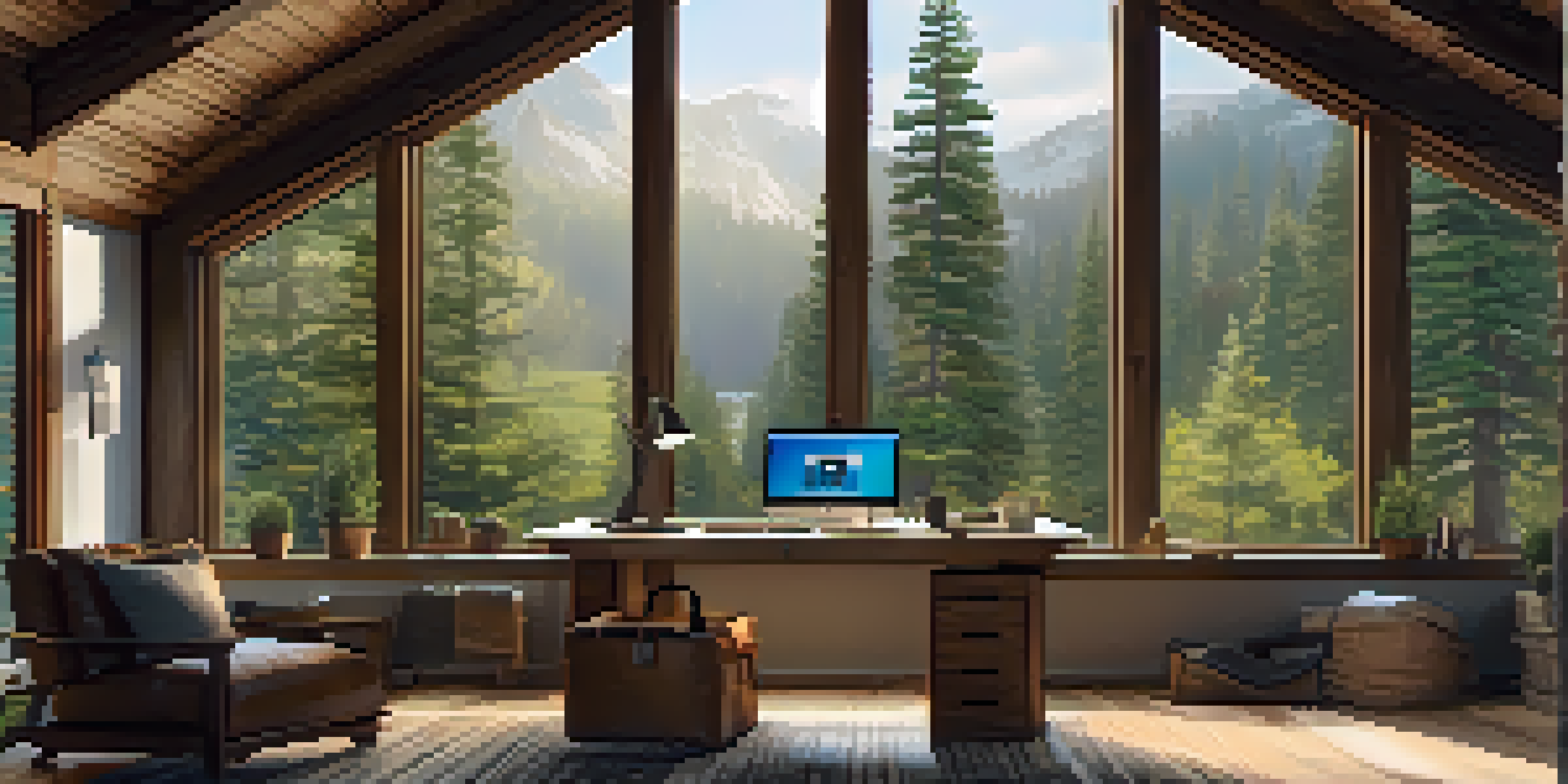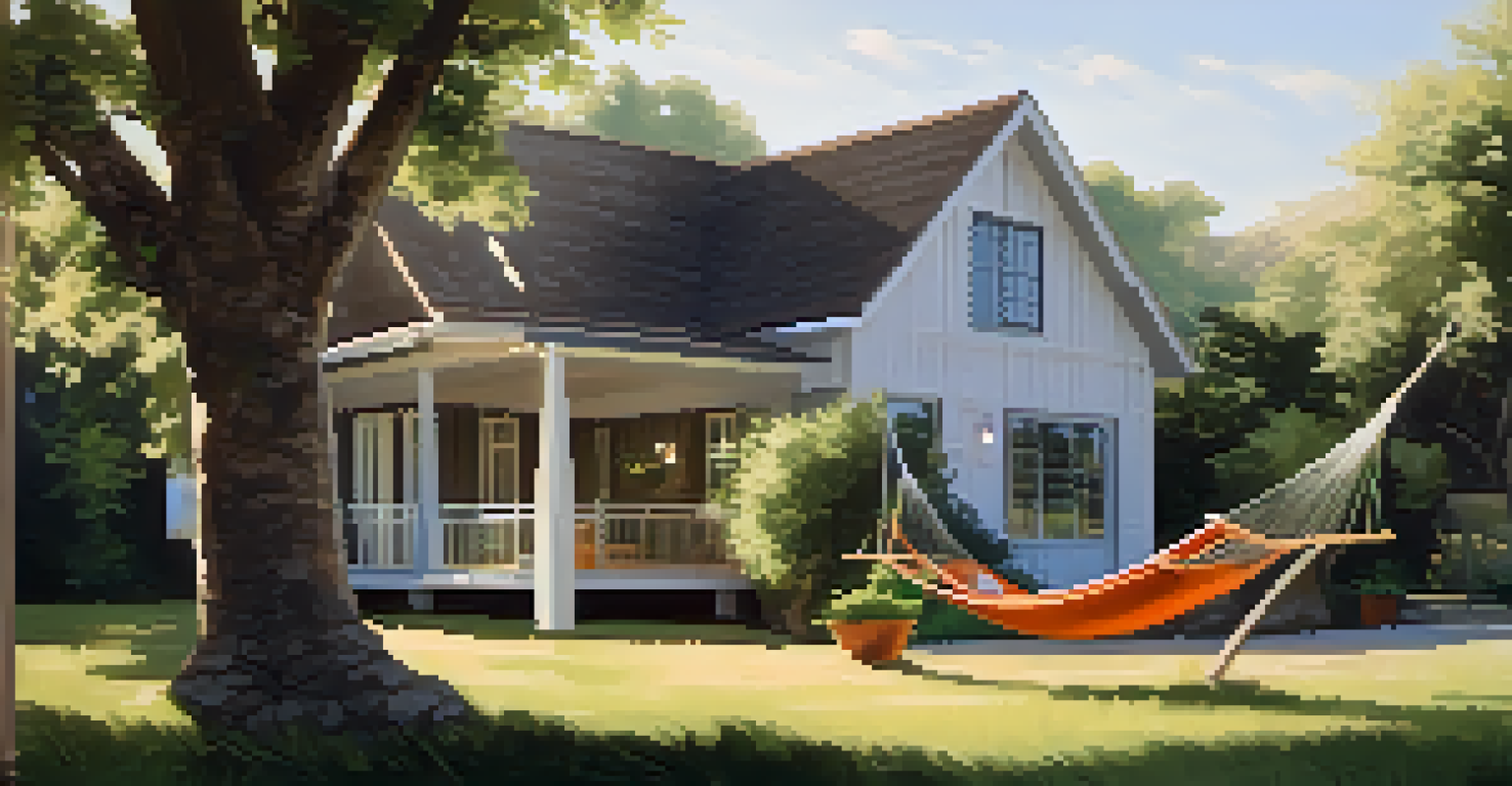Remote Work's Effect on Vacation Homes and Second Properties

Remote Work: A Game Changer for Vacation Home Demand
The rise of remote work has transformed how people view vacation homes. No longer just a place for occasional getaways, these properties are becoming essential for work-life balance. Many individuals are now seeking locations that offer both leisure and a productive environment, driving up demand in scenic areas.
Remote work has unlocked the door to a new way of living, where home is no longer just a place to sleep, but a space that can nourish both work and leisure.
This shift means that buyers are looking for homes equipped with office spaces, strong internet connectivity, and peaceful surroundings. For example, a mountain cabin with a cozy workspace can attract those looking to escape city life while still being productive. As a result, real estate markets in popular vacation spots are experiencing a surge.
The trend also reflects a broader societal change where work and leisure are blending more than ever. As people prioritize experiences over traditional living arrangements, the concept of a second property evolves, with buyers wanting spaces that serve dual purposes.
Geographical Preferences Shifting with Remote Work
With the flexibility of remote work, geographical preferences are shifting significantly. Urban centers that once dominated home-buying trends are seeing a decline, while rural and suburban areas are gaining popularity. People are increasingly drawn to locations that offer natural beauty and a slower pace of life, such as lakeside cottages or countryside retreats.

For instance, families might opt for a spacious home in a quiet town, where they can enjoy outdoor activities on weekends while still having a reliable internet connection for work. This shift is not just limited to individuals; companies are also embracing this trend, encouraging employees to relocate to areas that enhance their quality of life.
Remote Work Boosts Vacation Home Demand
The rise of remote work has made vacation homes essential for achieving work-life balance, leading to increased demand in scenic locations.
As a consequence, we’re witnessing a reimagining of what it means to have a second home. Instead of being a mere vacation spot, these locations are becoming integral to daily life, as more people choose to live where they vacation.
Investment Opportunities in Vacation Markets
The surge in remote work is opening up new investment opportunities in vacation markets. Investors are realizing that properties in desirable locations can yield significant returns, especially as rental markets grow. Platforms like Airbnb have made it easier for property owners to capitalize on this demand by renting out their homes to remote workers seeking temporary accommodations.
The future of work is not just about where we work; it's also about where we live and how our environments shape our lives.
Moreover, as more people recognize the potential of owning a second property, competition in the market is intensifying. Investors are looking for homes that not only provide a great escape but also serve as a reliable income source. This dual-purpose approach is reshaping investment strategies and driving innovation in property management.
Ultimately, the blending of work and leisure is fostering a dynamic real estate landscape. Investors and homeowners alike are adapting their strategies to meet the evolving needs of remote workers, creating a vibrant market for vacation homes.
Challenges in the Evolving Vacation Home Market
While the demand for vacation homes is on the rise, it's not without its challenges. Increased interest has led to rising property prices, making it difficult for some buyers to enter the market. The competition can be fierce, particularly in popular areas where inventory is low and demand is high.
Additionally, potential buyers must navigate the complexities of maintaining a second home, such as property management and maintenance costs. For those who want to rent out their properties, understanding local regulations regarding short-term rentals becomes crucial. These hurdles can deter some from pursuing their dream of owning a vacation home.
Shifting Preferences to Rural Areas
As remote work allows for greater flexibility, buyers are increasingly favoring rural and suburban homes over urban centers for a more peaceful lifestyle.
Despite these challenges, many find the benefits worth the effort. The allure of a personal retreat, combined with the possibility of generating income, keeps the dream alive for many aspiring buyers.
The Role of Technology in Managing Vacation Homes
Technology plays a pivotal role in the management of vacation homes, especially for remote workers. Smart home devices allow owners to monitor their properties from afar, ensuring everything runs smoothly, whether it’s managing security or controlling heating and cooling systems. This convenience makes it easier for individuals to invest in vacation homes without the constant worry of being physically present.
Furthermore, various apps and platforms simplify the process of renting out properties. Owners can easily list their homes, communicate with potential renters, and manage bookings, all from their smartphones. This tech-savvy approach appeals to remote workers who value efficiency and flexibility.
As technology continues to evolve, it will further streamline the vacation home experience, making it more accessible for those looking to blend work and leisure seamlessly. Embracing these innovations can enhance the ownership experience and open new avenues for income generation.
Lifestyle Changes Inspired by Remote Work and Second Homes
The shift to remote work is inspiring lifestyle changes that extend beyond just work environments. Many are adopting a more balanced approach to life, prioritizing well-being and quality time with family. This change often leads to the desire for vacation homes that provide a sanctuary away from the hustle and bustle of daily life.
For example, people are increasingly choosing to spend more time in nature, seeking homes that offer proximity to parks, beaches, or hiking trails. These lifestyle shifts encourage a sense of community as more individuals seek out locations that foster connection and tranquility.
Tech Simplifies Vacation Home Management
Technology is enhancing the management of vacation homes, making it easier for owners to monitor properties and rent them out while working remotely.
As remote work continues to shape these lifestyle choices, the importance of creating a harmonious living environment becomes paramount. Vacation homes are now seen not just as a luxury, but as an essential component of a fulfilling life.
The Future of Vacation Homes in a Remote Work Era
Looking ahead, the future of vacation homes in the remote work era appears bright. As more companies adopt flexible work policies, the demand for second properties is likely to continue its upward trajectory. Homebuyers are expected to prioritize locations that offer both work-friendly amenities and leisure opportunities, making vacation homes a hot commodity.
Additionally, as remote work becomes more normalized, we might see a rise in hybrid models where individuals split their time between their primary residences and vacation homes. This trend could further blur the lines between work and leisure, creating new opportunities for property owners and investors alike.

Ultimately, the intersection of remote work and vacation homes is reshaping our understanding of homeownership. As lifestyles evolve, so too will the way we think about where and how we live, making this an exciting time for both buyers and sellers in the real estate market.